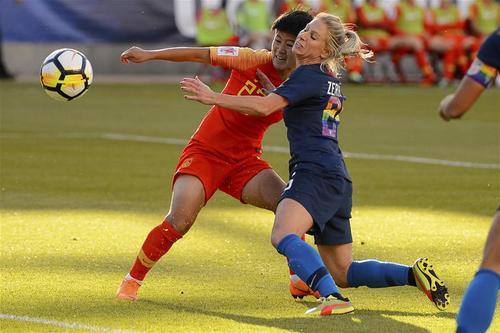The world of women's soccer boasts numerous teams of varying strengths and capabilities. Two prominent contenders in this arena are the United States Women's National Soccer Team (USWNT) and the Chinese Women's National Football Team. In this comparative analysis, we delve into various aspects of both teams, including their historical performance, playing styles, key players, and strategies, to provide insights and guidance for enthusiasts and stakeholders alike.
The USWNT is widely regarded as one of the most successful teams in women's soccer history. With four FIFA Women's World Cup titles (1991, 1999, 2015, 2019) and four Olympic gold medals (1996, 2004, 2008, 2012), they have consistently dominated the international stage.
China's women's soccer team has a rich history, having reached the FIFA Women's World Cup final in 1999, where they finished as runnersup to the United States. They also secured the silver medal at the 1996 Atlanta Olympics. While they haven't clinched as many titles as the USWNT, they remain a formidable force in women's soccer.
The USWNT is renowned for its physicality, speed, and athleticism. They often employ a highpressing game, suffocating opponents with relentless pressure and quick transitions. Additionally, their emphasis on setpiece proficiency and aerial prowess makes them a threat from deadball situations.

The Chinese team is characterized by their technical proficiency and tactical discipline. They prioritize ball possession and strategic buildup play, often relying on precise passing and movement to break down opposition defenses. Their defensive organization and ability to control the tempo of the game are key components of their playing style.
The USWNT boasts a roster of talented players, past and present. Notable figures include Alex Morgan, Megan Rapinoe, and Carli Lloyd, who have made significant contributions to the team's success with their scoring prowess, creativity, and leadership on the field.
China's women's soccer team has produced several standout players over the years. Players like Sun Wen, Ma Xiaoxu, and Wang Shuang have showcased their skill and ability to influence matches with their technical proficiency, vision, and goalscoring capabilities.
The USWNT often adopts an aggressive approach, pressing high up the pitch to force turnovers and capitalize on opponents' mistakes. They utilize their speed and athleticism to launch quick counterattacks, exploiting gaps in the opposing defense. Additionally, their adaptability allows them to adjust tactics based on the strengths and weaknesses of their opponents.
China's team prioritizes a patient and methodical approach, focusing on ball retention and positional play to control the flow of the game. They excel in exploiting space and creating scoring opportunities through intricate passing sequences and intelligent movement off the ball. Their defensive solidity and ability to stay organized under pressure enable them to frustrate opposing teams and dictate the tempo of matches.
In conclusion, both the United States Women's National Soccer Team and the Chinese Women's National Football Team possess unique strengths and attributes that contribute to their success on the international stage. While the USWNT emphasizes athleticism and hightempo play, the Chinese team relies on technical proficiency and tactical discipline. Understanding these differences can provide valuable insights for coaches, players, and enthusiasts seeking to enhance their understanding of the game and its strategic nuances.
This analysis provides a comprehensive overview of the United States Women's National Soccer Team and the Chinese Women's National Football Team, encompassing their historical performance, playing styles, key players, and strategies. Whether you're a fan, coach, or player, understanding the intricacies of these teams can deepen your appreciation for the beautiful game of soccer.
